Assassin’s Creed Mirage Review
A lot of killer, plenty of filler

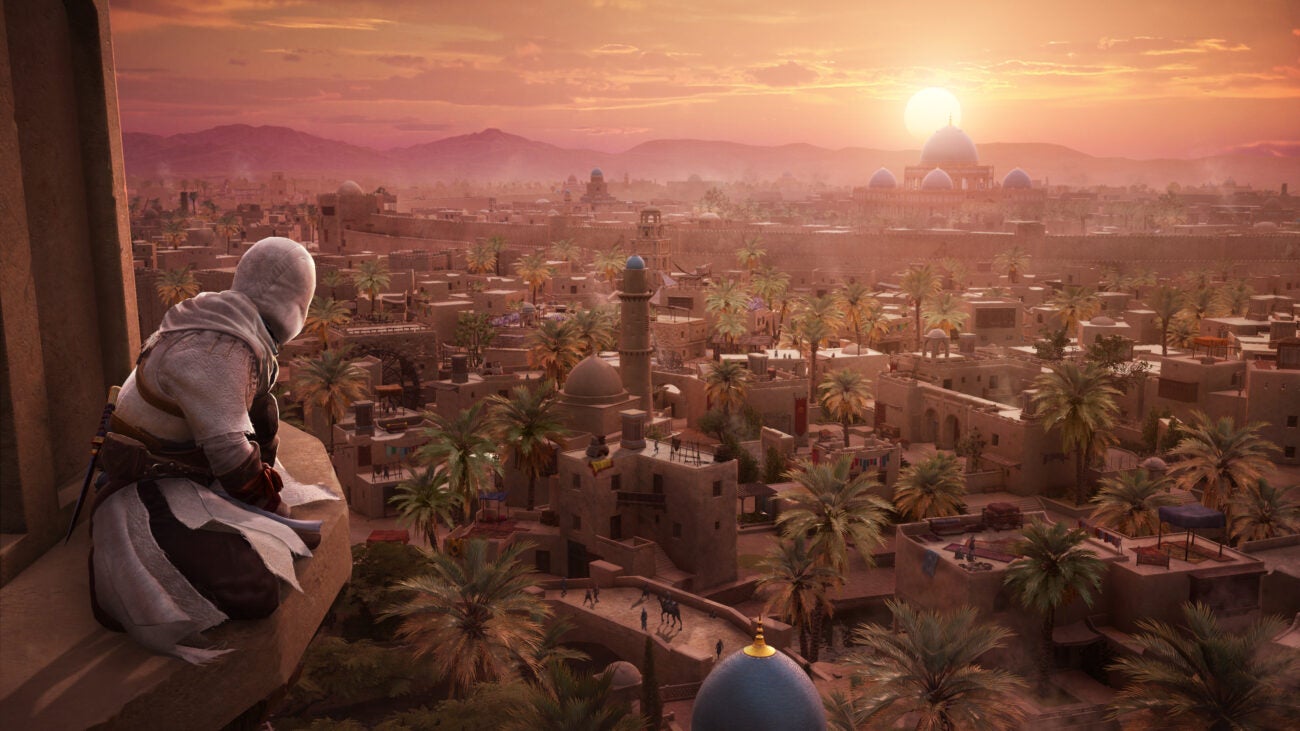
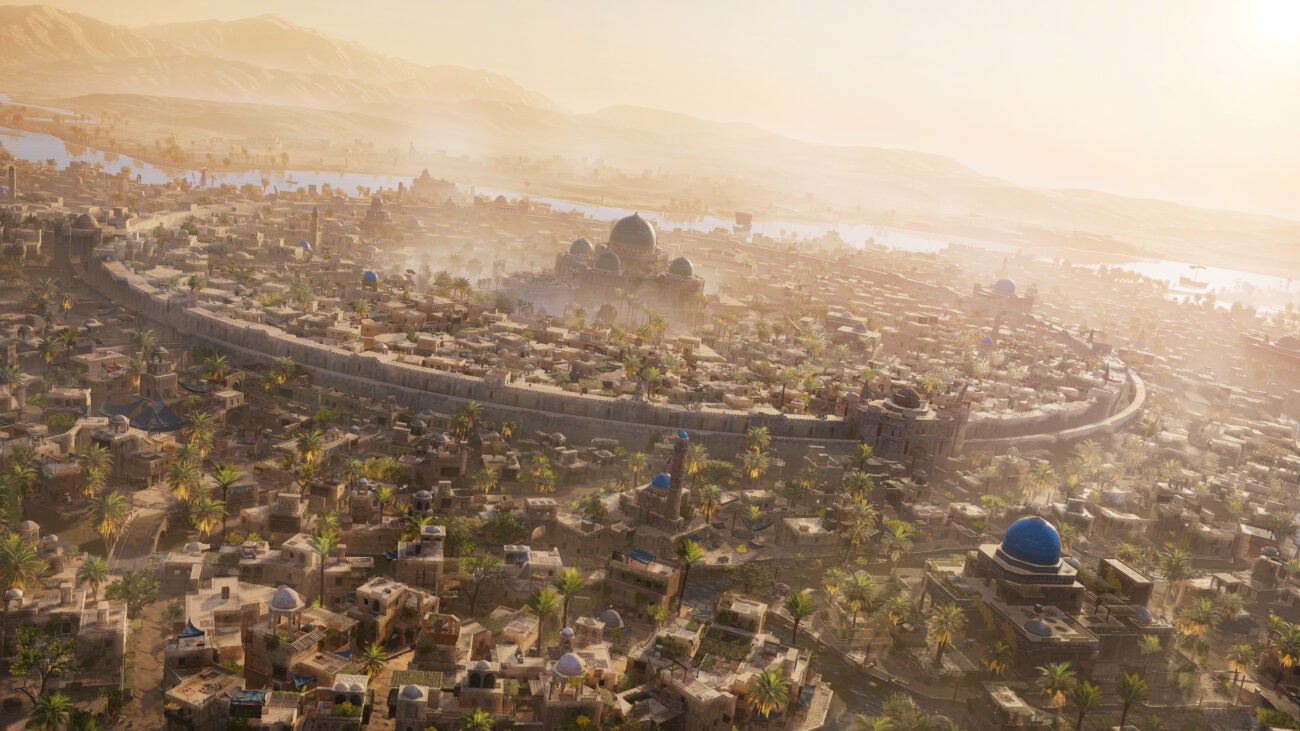
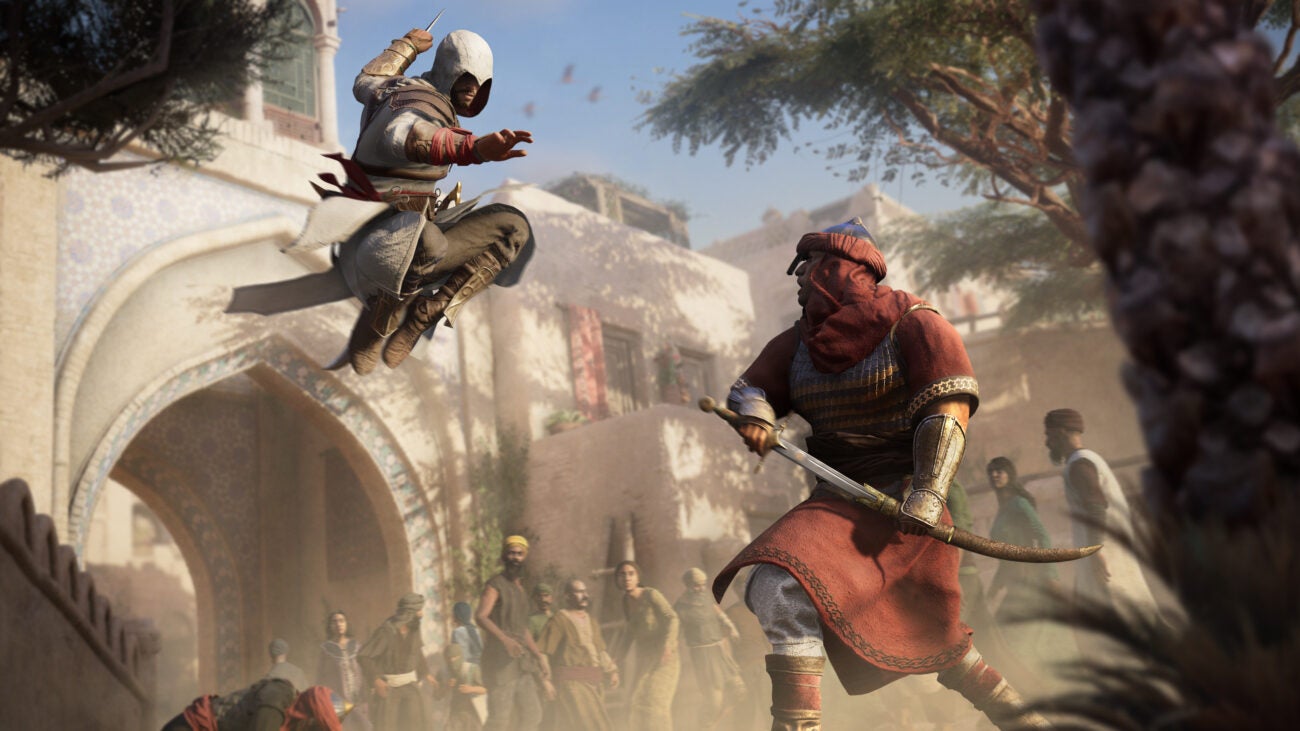






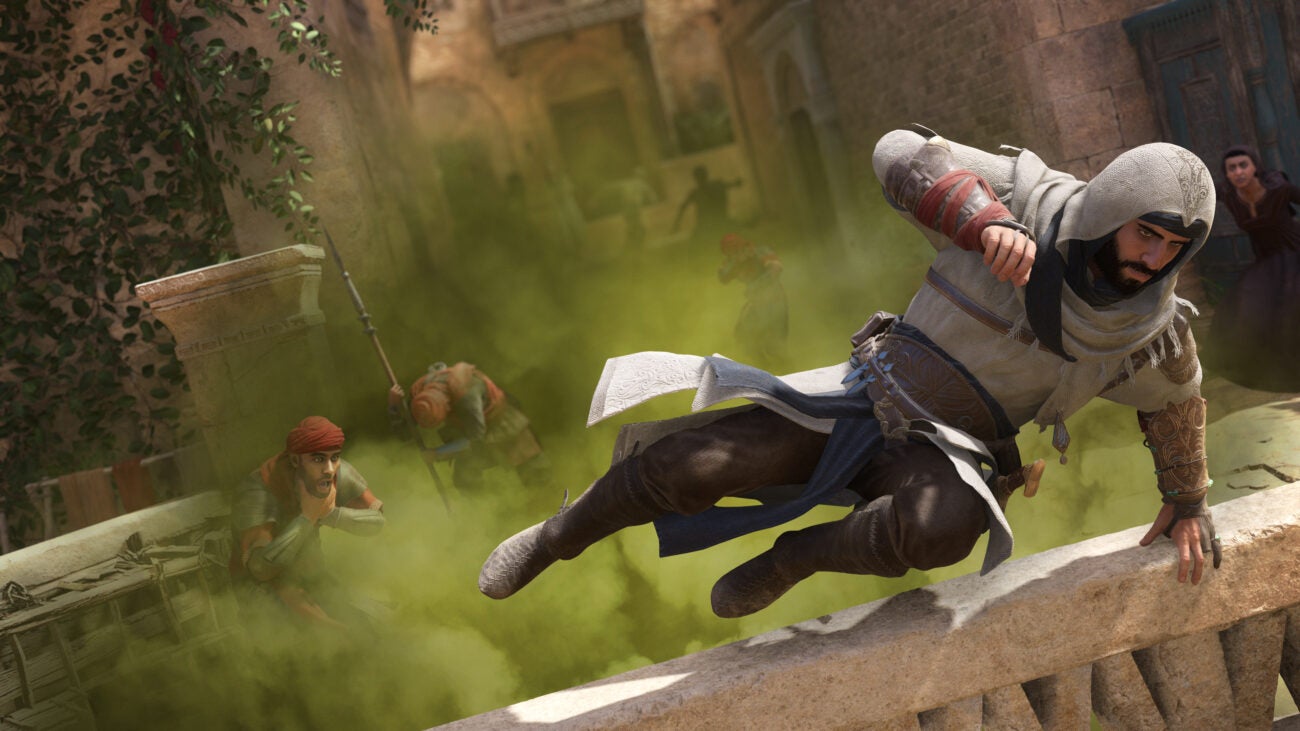
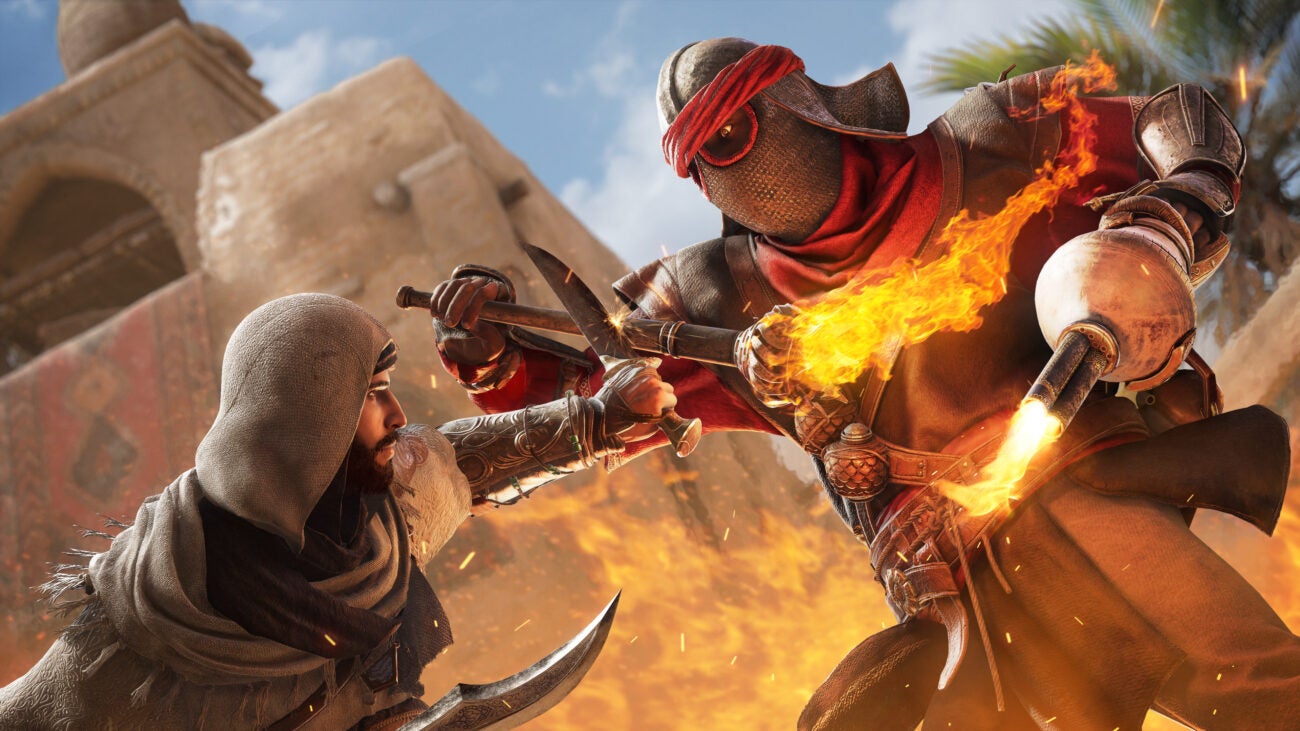
Verdict
Assassin’s Creed Mirage is a condensed version of the modern Assassin’s formula. That may disappoint some who hoped for something that felt new while also significantly harkening back to the series’ past. Stealth does get a boost, alongside occasional engaging narrative and characters, but there’s plenty of padding that dampens the fun.
Pros
- A playground for assassinations
- Glorious scenery
- Some interesting characters and story beats
Cons
- Still plenty of filler
- Stealth and combat lack real depth
- Parkour isn’t a return to form
Key Features
- PlatformsPS5, Xbox Series X|S, PS4, Xbox One, iOS and Windows
- Release Date5 October 2023
- GenreAction-adventure
Introduction
Is old Assassin’s Creed back? That’s been the burning question leading up to the release of Assassin’s Creed Mirage, with the game sold on the premise you’ll once again feel like an assassin. The answer isn’t a resounding yes but, once again, this is a game about assassinations.
There might have been a danger of regression rather than revolution with Mirage but it’s neither really, which may disappoint some who wanted a true “old Assassin’s Creed game”.
Condensation is the most appropriate descriptor and, as such, it isn’t the satisfying return to form that many will have hoped for. Here’s my full review.
Story
- Main storyline can completed in well under 20 hours
- Basim’s personal struggle is intriguing but under-explored
- Exciting bursts of narrative, but largely unfocused
The story of Mirage kicks off with a lot of promise. You’re propelled into a new adventure, steadily being introduced to new characters with thoughtful dialogue that quickly teaches you their personalities and motivations.
The forward momentum continues as you learn the origin of the lead character, Basim, who we first met later in his life in Assassin’s Creed Valhalla. The story’s opening is set in the smaller town of Anbar and, then, at Alamut – the base of The Hidden Ones’ operations.
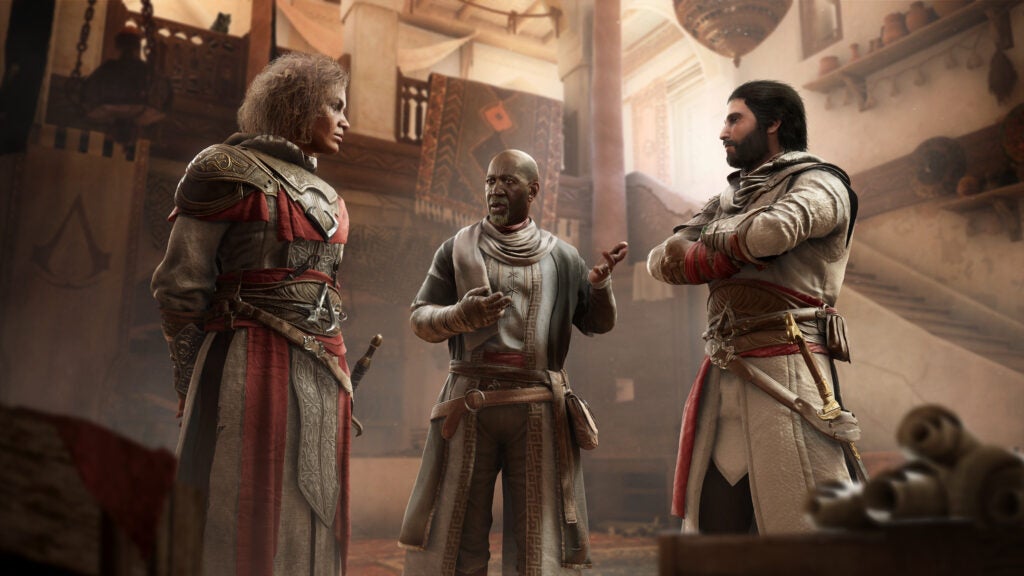
The opening missions provide you with smartly crafted build-up as you assist The Hidden Ones in ridding the world of The Order of the Ancients. However, shortly after you arrive in Baghdad, the main setting of the game, the story splits into four routes and it’s a disappointing dilution.
Four leaders within The Hidden Ones are spread across guilds in Baghdad and you’ll be set on a path by each of them, finding a head honcho within The Order of the Ancients to defeat in each region. But, it feels like a box-ticking exercise.
Sure, some of the targets have interesting motivations and you’ll encounter other characters adjacent to the central conflict. A rebel leader named Ali, in particular, is a character that often shows promise, with practices misaligned with how The Hidden Ones like to do things, but it’s unsatisfyingly never fully explored or expanded upon.
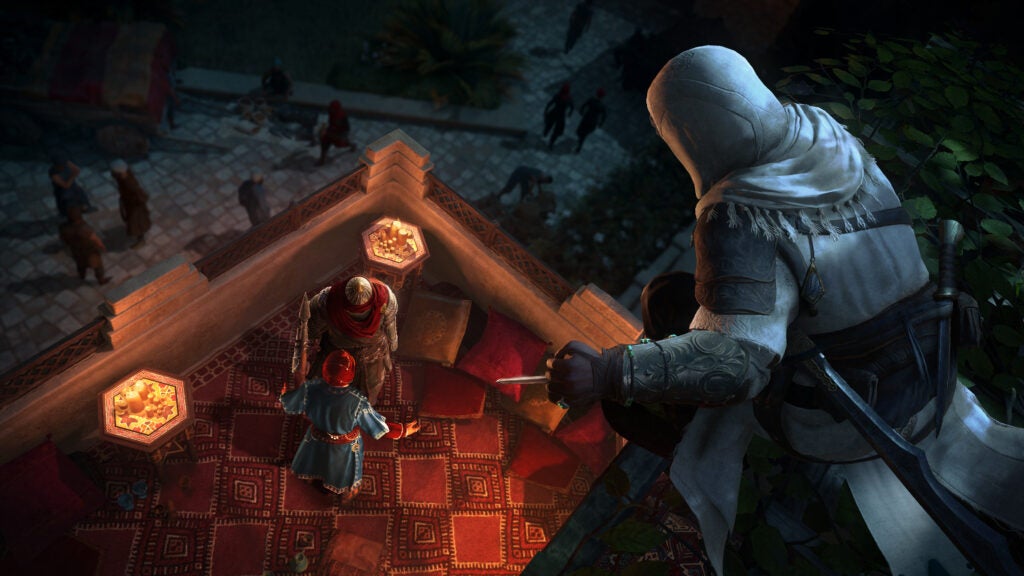
The most satisfying narrative elements often come from side missions, including Contracts and Tales of Baghdad. The former is made up of straightforward assassin missions where you’re often tasked with tailing, pickpocketing, eavesdropping on and, eventually, taking down targets. And, that’s often paired with added objectives like not being detected or carrying out an environmental kill.
Nestled within these are often little interesting nuggets of narrative. Tales of Baghdad are a rare instance in this game where you’ll stumble upon a story rather than having to actively seek it out, where you’ll meet a new character with intriguing motivations and you’ll have to assist them with a task. They are engaging and rewarding small tales.
The rush towards the climactic encounter does provide some satisfying beats, as Basim wrestles with his goals as an assassin and wanting to understand his true nature. But that is then usurped by some additional information drops that you’ll likely only be clued in on if you were fully invested in the narrative of Assassin’s Creed Valhalla. As such, it ended on a bit of a sour note. Basim’s journey is interesting, but the misadventure in the middle of the story largely sidelines his conflict and a satisfying ending is lost in ticking off some lore points.
Exploration
- Parkour is fleetingly excellent
- Fun side missions
- Not many secrets to uncover
Discovery isn’t a concept that’s at the forefront of Assassin’s Creed Mirage. The answers that you may find when exploring in more spontaneous games (such as Red Dead Redemption 2) are offered up here with directions to boot once you synchronise from atop a large building, in classic AC fashion.
Exploration in Mirage may not be something that rewards you in terms of new tasks or narrative but, for the most part, it is very fun to do. Once you arrive in Baghdad, you are invited into a sprawling city that is begging you to hop across its rooftops and dodge through its streets.
However, after a few hours exploring Baghdad, it does feel like you’ve seen it all before and I also didn’t find the layout of the city to be as meticulously planned as previous entries. I’d regularly get into the flow of scurrying up buildings or across roofs only to find myself jumping off into a frustrating bit of fall damage, breaking the flow.
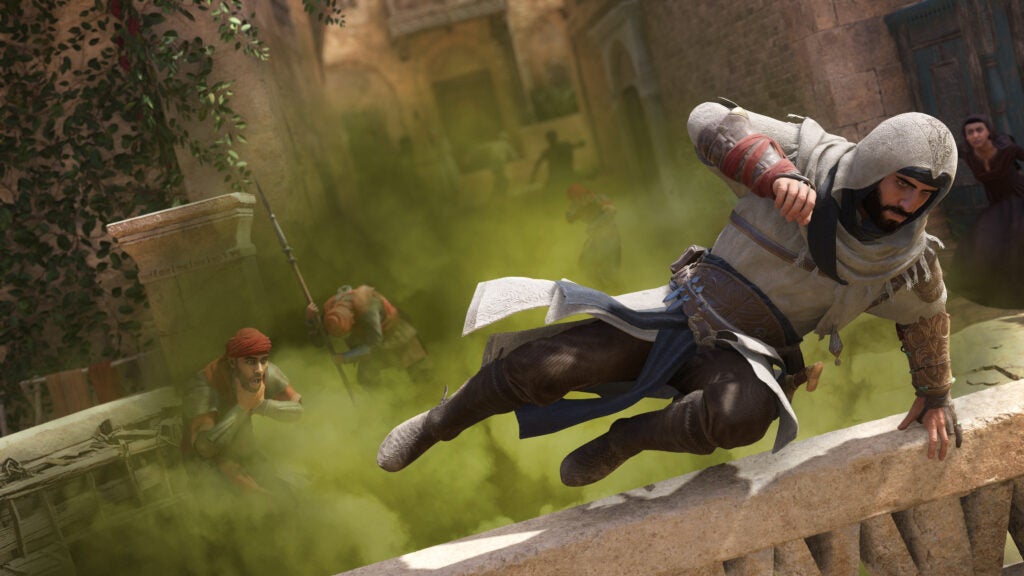
In terms of further side objectives, you’ll stumble upon Gear Chests, Lost Books and Enigmas to find. Then, there’s Dervis’ Artifacts and Mysterious Shards that you’ll have to acquire through pickpocketing and murder. Enigmas are perhaps the most intriguing activity, tasking you with hunting down a reward using clues such as visual maps, riddles or letters. Such tasks are rather challenging compared to the box-ticking nature of some of the other activities, while also encouraging you to explore the map more thoroughly.
I was initially excited by the new pickpocketing mechanic, but you can swiftly improve your pickpocketing with Skill Points, reducing the challenge significantly. Nevertheless, pickpocketing remains handy for acquiring more materials as well as gaining tokens – a pivotal aspect of Mirage.
Along with pickpocketing, you can gain tokens by completing Contracts. Tokens can then be used in a couple of different ways. The first is to reduce costs at relevant merchants and the second is to, well, ask for favours. You can use them to lower notoriety as well as to ask civilians to assist you in gaining access to an area, such as causing a fight or drawing attention by singing. These certainly add to the fun of navigating your way into a large garrison before beginning your hunt.
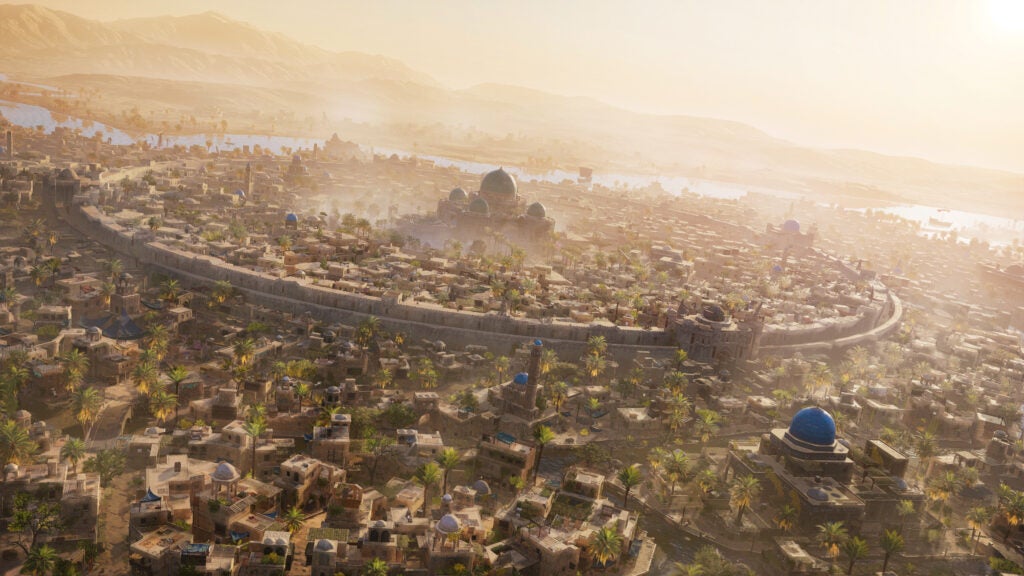
Returning to the concept of notoriety, this is represented by a bar that fills up as you commit unlawful acts throughout Baghdad. It comes in three stages of increasing danger. You can lower it by talking to a Munadi and bribing them with a token, taking down Wanted posters or eliminating the Shakiriyya hunting you. It’s a merry dance you’ll have to navigate throughout but it rarely feels like it has a significant impact on your gameplay, instead giving you the odd random opportunity to test out your fighting aptitude.
The map is, admittedly, grander than Baghdad itself and there is some fun to be had just riding around and admiring the landscape. That riding around is afforded to you by the choice of a camel or horse as your mount which, given the frequency of fast travel points and the smaller size of this map, aren’t really needed outside of planned use in missions or just having a jaunt of your own accord. After spending several hours in the city, the desert and grassland outside of its walls become a welcome change. There just isn’t much to do, outside of the odd Contract, so there’s little satisfaction in terms of discovery.
Combat
- Extremely powerful stealth
- Direct combat remains feasible, if basic
- Tools that are enjoyable to use
You are truly an assassin once again in Assassin’s Creed Mirage, but it isn’t as cut-and-dry as the stealthy dispatching of enemies being the only option.
Ahead of the game’s release, it appeared that taking on enemies in direct combat would be an exercise in folly, but it is more than doable, with parrying and dodging mechanics at the forefront. So stealth isn’t such a priority that you’re completely goosed if it goes awry and, in some ways, I wish it was.
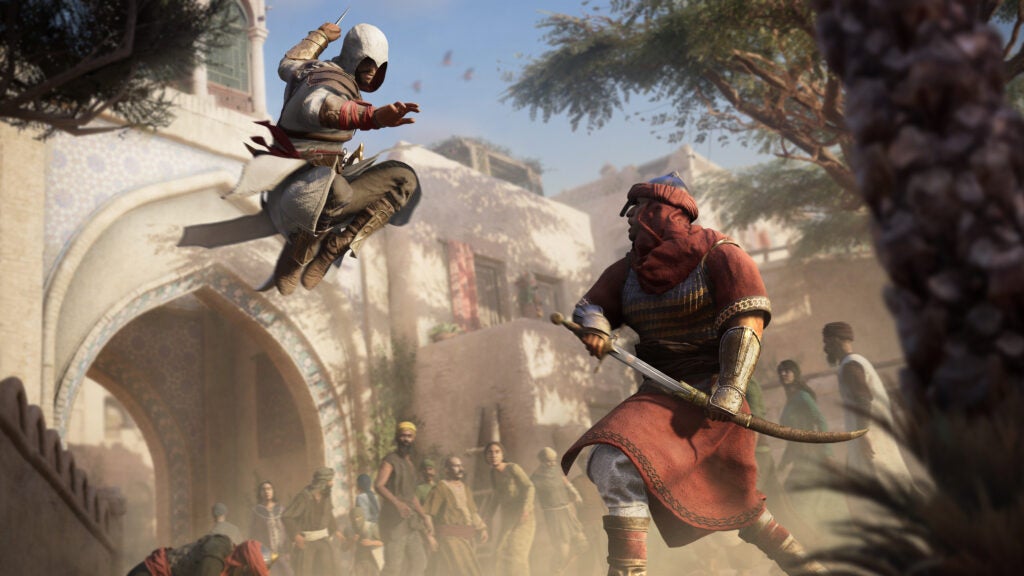
The stealth offers up occasional moments of wondrous satisfaction, but this does hugely vary with the playground you’re presented with. Some areas feel thoughtfully crafted to create a puzzle for you to navigate, with guards positioned carefully and their routes potentially causing chaos if you leave a body where it shouldn’t be. But, with many sections in the game, guards are positioned too frequently out on their own and, even before you get powerful tools in your arsenal, you can easily dispatch reams of enemies from a bush with a whistle and an assassination. And, that’s not satisfying.
However, in the moments where it does all come together, you’ll nestle atop a roof in enemy territory and be able to visualise a route in front of you, before you dive in and execute your plan. The tools you gain as you progress allow for easier assassinating of multiple enemies, like smoke bombs, noisemakers, blowdarts and more, while Assassin’s Focus is the most powerful. The ability allows you to target and, essentially, teleport from enemy to enemy as you take them down with Hidden Blade as you go.
But what about levels? In recent Assassin’s Creed games, you could be trounced by enemies far beyond your level. Well, in Mirage, there are none. Instead, the difficulty of enemies is simply determined by the type you face, from lowly swordsmen to bench horn bearers.
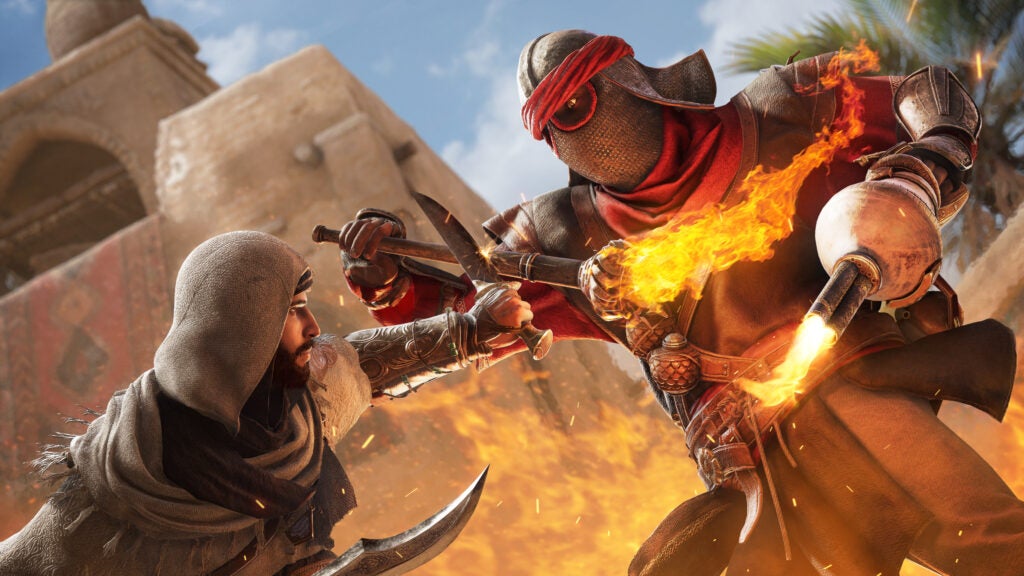
Nevertheless, there are Skill Points to be gained, outfits to modify and weapons to upgrade. You’ll earn Skill Points through completing missions throughout Mirage which can then be spent on a rather pared-back Skill Tree, which is divided into three sections and gives you access to things like improved Eagle Vision through your trusty bird Enkidu – a useful mechanic for planning your assault on an area once again – or the ability to assassinate multiple targets. Since enemies don’t increase in difficulty throughout the game, you’ll find that Mirage gets increasingly easier as you play through it.
You can also pin some of this on the ability to upgrade your outfit, dagger and sword. You’ll discover new outfits and weapons throughout the world, and some you can simply buy. They offer different abilities, like health regeneration and boosted stealth, which increase when upgraded. Upgrades are done through tailors and blacksmiths, who will boost your wares using materials (Leather, Steel Ingots and Components) that you’ve picked up alongside Upgrade Schematics you’ll have also uncovered. You can also boost the abilities of your tools in a similar fashion, but within the Assassin’s Guilds located in Baghdad.
Performance and Graphics
- A near-seamless living city
- Breathtaking sights to see outside of Baghdad
- 30fps Quality mode / 60fps High Framerate mode
In terms of performance and dodging graphical mishaps, Mirage is a refined piece of work. On my PS5, the game ran seamlessly. I played much of my review time in Quality mode to grab as much rich detail from the world of Mirage as possible from running at 4K 30fps, and it was a delight.
There’s also an Iconic Color Filter mode, playing into the idea that this is a return to AC of old, putting a blue and cool colour layer over the top of your gameplay. It’s nice to try out but you’ll likely abandon it fairly sharpish to return to the modern, vibrant colours.
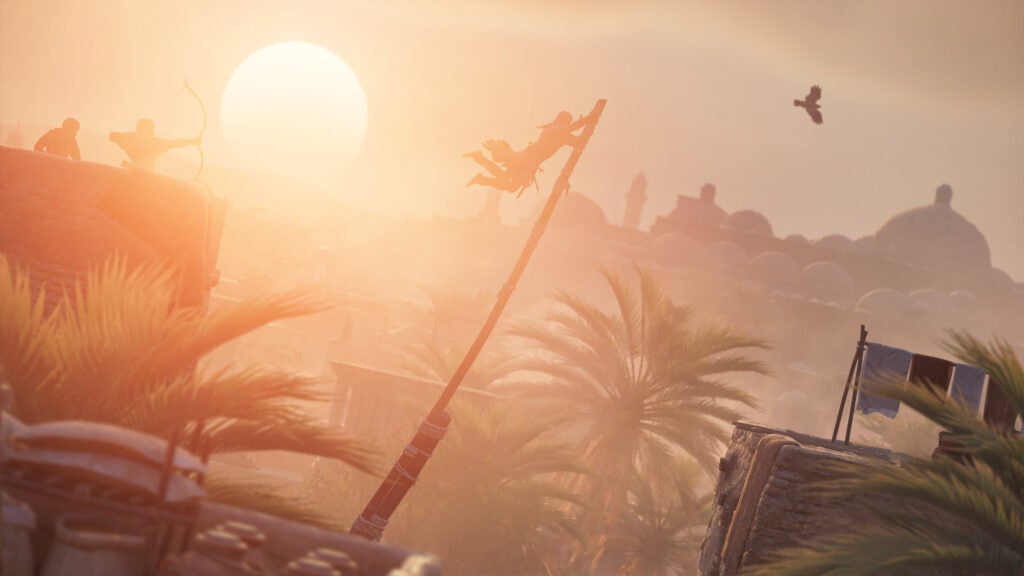
Early on, I took the graphical prowess on show here for granted, distracted by the goings on in the city of Baghdad to truly appreciate the visuals. But, it really hit me when it came time to synchronise as well as when venturing outside of the city.
In particular, the first time I went meandering beyond the walls of Baghdad to track down a contact, I charged through grassland on my trusty steed and, as I hopped over a lake, a flamboyance of flamingos took off, flying across the rising sun. It was a breathtaking moment. The map in Mirage may not always feel well crafted in terms of exploration or stealth gameplay, but it is a city to behold. Details feel hand-crafted and the variety of colours is designed to delight.
Latest deals
Should you buy it?
If you want more modern Assassin’s Creed in a smaller, more stealthy package
Mirage is another dose of contemporary Assassin’s Creed. It is a condensed version of Valhalla that ditches RPG depth for a larger push towards stealth. If that’s enough for you, have at it.
If you expected a full return to old Assassin’s Creed
There are still plenty of largely shallow box-ticking exercises in this game, including in the majority of the main story. As with recent entries, high points are infrequent even if middling enjoyment is present throughout.
Final Thoughts
Assassin’s Creed Mirage doesn’t quite deliver on its core premise. This isn’t a stealth-above-all-else Assassin’s Creed game. In the simplest of terms, it’s a condensed and reined-in version of the series’ modern RPG model, with a smidgen of extra stealth-flavoured focus sprinkled on top.
From the off, the story did seem like it was going to benefit from a less sprawling map to spread it across, but after a few hours the focus is lost and so is much of this game’s interest in the core conflict residing in Basim. It, then, returns towards the end of the game only to be usurped by tie-ins to the rest of the series.
Ultimately, I can see how Mirage started off as being a DLC, and it may have been better off staying that way to give a truly focused Assassin’s Creed experience. Nevertheless, fleeting moments through this game were a true joy – both exhilarating and intriguing – so it’s just a shame there weren’t more of them.
How we test
We play every game we review through to the end, outside of certain exceptions where getting 100% completion, like Skyrim, is close to impossible to do. When we don’t fully finish a game before reviewing it, we will always alert the reader.
Played on PS5
Completed the story campaign
FAQs
Mirage is said to have started off as a piece of downloadable content for Assassin’s Creed Valhalla. But, it has been fleshed out and released as a full game, albeit at a lower price than other AAA titles.
Mirage tells the origin story of Basim, who we first meet in Assassin’s Creed Valhalla.
I managed to complete the main story of Mirage in under 20 hours. There’s likely around 5-8 hours of additional content to be had when aiming to 100% this game.







